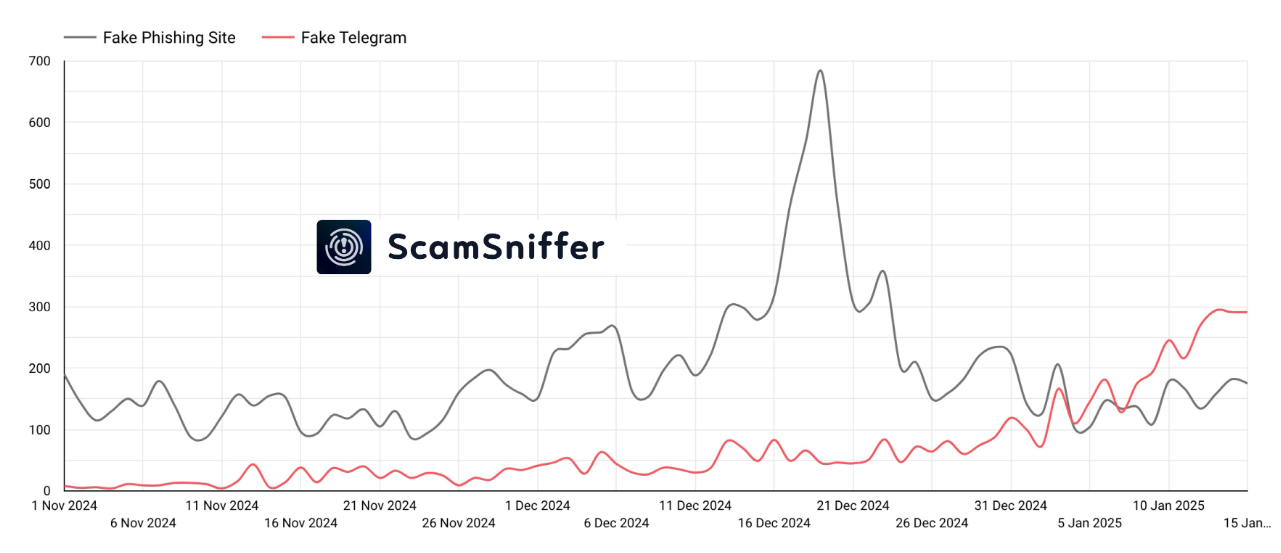It was found by Scam Sniffer that there has been a massive increase of more than 2,000% in cryptocurrency phishing scams on Telegram, starting from November 2024. This indicates a move towards advanced techniques involving malware.
The increase in harmful actions underscores the expanding dangers faced by cryptocurrency communities that utilize such platforms.
Telegram Crypto Phishing Scams On The Rise
According to data from Scam Sniffer, which was posted on X (Twitter), it appears that Telegram scams are now more common than traditional phishing attempts. Although the frequency of regular phishing attacks has remained consistent, there’s been a significant increase in harmful activities within Telegram groups, posing potential threats to users like never before.

Pointing out a modern form of deceit, the security analyst highlights that unlike conventional “connect your wallet” phishing tactics, these fraudulent activities on Telegram utilize more advanced techniques. In particular, Scam Sniffer identifies:
1. The use of fake profiles or groups to impersonate well-known crypto exchanges, wallets, or other trusted entities.
2. The deployment of malware disguised as a legitimate app or link, which is then used to gain unauthorized access to victims’ wallets.
3. The implementation of social engineering tactics, such as creating a sense of urgency or fear, to trick users into disclosing sensitive information.
4. The exploitation of trust by targeting individuals who are active in the crypto community and appear knowledgeable about blockchain technology.
- Fake Verification Bots: Disguised as security tools, these bots trick users into executing malicious commands.
- Fake Trading and Airdrop Groups: These groups lure victims with promises of exclusive investment opportunities or free crypto.
- “Exclusive” Alpha Groups: Impersonating crypto influencers, scammers create urgency to bait victims.
When people interact with these fraudulent schemes—either by running provided code or downloading “authentication” software—they potentially put their confidential data at risk. This encompasses login credentials, digital wallet files, web browsing details, and even the history of copied text, all of which may be utilized to swipe cryptocurrency.
The change in strategies is due to users becoming increasingly wary of traditional fraud techniques like signature scams and phishing emails. According to Scam Sniffer, this new form of malware gives attackers wider control and makes it much harder to trace losses. In light of these developments, the researcher cautions that this evolution signifies a worrying trend in cryptocurrency scams.
To fend off these dangers, Scam Sniffer recommends abstaining from running commands or scripts that are not recognized, and refrain from installing software from Telegram groups that haven’t been verified.
According to Scam Sniffer, a trustworthy cryptocurrency service will never require you to carry out commands, set up verification programs, or run scripts directly from your clipboard.
Besides warning users about potential scams, this security platform recommends utilizing hardware wallets as they offer an additional protective measure by storing private keys away from internet access.
Telegram’s Role Under Scrutiny
It’s observed that an increase in Telegram scams related to malware is happening simultaneously with other significant instances of cryptocurrency fraud. Various security organizations have found and flagged Telegram groups spreading deceptive practices, which highlights the potential weaknesses in the platform’s security.
As a researcher delving into the realm of digital currency, I’ve come across an alarming trend: scammers have been posing as influential figures in the crypto sphere, enticing users to join supposedly exclusive Telegram groups. A post by Scam Sniffer in December shed light on these deceptive practices. In these groups, the scammers employ fake verification bots to surreptitiously inject harmful PowerShell code into unsuspecting victims’ systems, compromising their security and potentially leading to significant losses.
Scam Alert: Crooks are exploiting crypto enthusiasts by setting up fraudulent Telegram communities that mimic well-known influencers in the crypto space. These cybercriminals employ fake bot accounts to authenticate users, according to Scam Sniffer.
It has been criticized that Telegram has not effectively addressed cryptocurrency fraud issues. In Spain, the service was temporarily halted due to complaints from media outlets regarding its involvement in scams and piracy. Simultaneously, a user on X platform voiced dissatisfaction over what they perceived as insufficient measures taken by the platform to prevent such activities.
The scrutiny on Telegram has grown significantly due to the recent detention of its CEO, Pavel Durov, in France. Durov is under investigation for allegedly facilitating illegal financial dealings related to criminal operations that were carried out using the Telegram platform.
He was informed that the authorities might hold him personally accountable for any illegal actions taking place on Telegram due to the platform’s inactivity.
Despite attempts to address it, this problem persists. In fact, fraudulent activities on Telegram, particularly malware scams, are escalating at an alarming rate. This underscores the importance of vigilance among users. With the platform receiving heightened attention and crypto-related scams on the rise, users must exercise extreme caution now more than ever.
Read More
- 30 Best Couple/Wife Swap Movies You Need to See
- DC: Dark Legion The Bleed & Hypertime Tracker Schedule
- PENGU PREDICTION. PENGU cryptocurrency
- Clair Obscur: Expedition 33 ending explained – Who should you side with?
- The Last Of Us Season 2 Drops New Trailer: Premiers April On Max
- Netflix’s ‘You’ Season 5 Release Update Has Fans Worried
- ANDOR Recasts a Major STAR WARS Character for Season 2
- In Conversation With The Weeknd and Jenna Ortega
- Scarlett Johansson’s Directorial Debut Eleanor The Great to Premiere at 2025 Cannes Film Festival; All We Know About Film
- All Hidden Achievements in Atomfall: How to Unlock Every Secret Milestone
2025-01-16 17:33